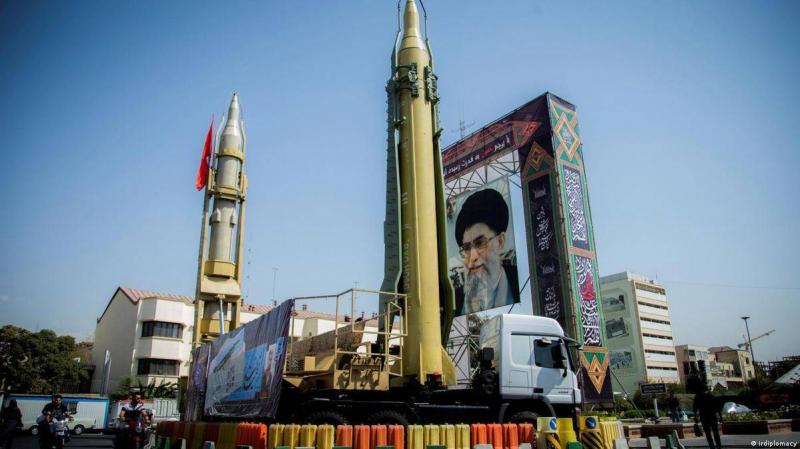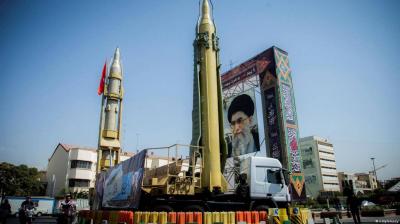Analysts believe that Iran's limited steps to slow the increase of its enriched uranium stocks—close to the levels necessary for weapon production—may help ease U.S.-Iranian tensions, but do not necessarily indicate that significant progress can be made toward a broader nuclear agreement before the upcoming U.S. elections in 2024. According to reports from the United Nations' International Atomic Energy Agency (IAEA), Iran has reduced the rate of production of uranium enriched to 60 percent, which is near the 90 percent purity used in weapons. It has also slightly diluted its stockpile of the 60 percent enriched uranium. However, this stockpile continues to grow. Iran currently possesses nearly enough enriched uranium at the 60 percent level to theoretically produce three nuclear bombs, according to IAEA estimates. It also has sufficient lower-enriched uranium to create more bombs.
At the same time, Iran has failed to address the IAEA's concerns regarding traces of uranium found at undeclared sites and has not made progress in reinstalling monitoring cameras despite long-standing pressures from the agency and Western powers to do so. Nuclear non-proliferation analysts suggest that Iran's nuclear slowdown might be sufficient for both the U.S. and Iran to continue exploring what they describe as "understandings" that Washington has never officially acknowledged, aimed at de-escalating tensions surrounding nuclear issues and others. They noted that this does not necessarily imply placing any actual restrictions on Iran's nuclear program before the U.S. elections scheduled for November 5, 2024, but it may help President Joe Biden avoid a politically devastating crisis with Iran as he seeks reelection.
Henry Rome of the Washington Institute for Near East Policy stated, “Slowing the increase in the stock of uranium enriched to 60 percent is a clear signal that Tehran is open to moving forward with 'understandings' for de-escalation with Washington.” Rome pointed out that the slowdown and expectations regarding a prisoner exchange between the U.S. and Iran this month pave the way for "more diplomacy this fall regarding the nuclear program, even if that is not aimed at arriving at a new agreement before the U.S. presidential elections." He added, "For Washington, there may be a low bar for what Iran needs to do for 'de-escalation' purposes," indicating that "Iran likely has crossed that threshold."
Biden's main goal appears to be keeping tensions under control, which range from Tehran's nuclear program to the militia attacks supported by it on U.S. interests in the Middle East. Regarding Iran's recent steps, analyst Eric Brewer from the Nuclear Threat Initiative remarked, “Iran has lifted its foot off the accelerator in some areas, but it is not hitting the brakes concerning its nuclear program.” He described these steps as a "mild de-escalation." He continued, "The value of the steps taken by Iran concerning nuclear non-proliferation is relatively small, but the goal of the U.S. de-escalation policy is not to solve the nuclear program immediately but to build political protection and avoid an outbreak of crisis."
Elliott Abrams, the former U.S. special representative for Iran under President Donald Trump, now with the Council on Foreign Relations, implied that until next year’s elections, the administration seems to desire calm and is willing to pay the price in the form of broad support for the Iranian regime. Abrams referred to the increase in Iranian oil exports despite U.S. sanctions and the transfer of six billion dollars in Iranian funds from South Korea to Qatar as part of a prisoner exchange agreement.
Although the Biden administration states that the money is moving from an account under restrictions to another account that can only be withdrawn for humanitarian purposes, it appears that Iran will have access to it in Qatar much more than it did in South Korea. The U.S. State Department avoids discussing whether any "understandings" were reached with Iran, partly because any admission of an agreement with Tehran concerning the Iranian nuclear program could trigger congressional review under U.S. law. A State Department spokesperson said on Tuesday that he had nothing to add beyond statements made in mid-August denying that there is any nuclear agreement between the U.S. and Iran, while not excluding the possibility of reaching unwritten understandings.
After taking office in January 2021, Biden attempted to revive the 2015 Iranian nuclear agreement, under which Iran committed to limits on its nuclear program in exchange for relief from sanctions imposed by the United States, the European Union, and the United Nations. Former Republican President Trump withdrew from the agreement in 2018, claiming it was too generous to Tehran and reimposed extensive U.S. economic sanctions on the Islamic Republic. Efforts to revive the agreement appeared to have failed almost a year ago when diplomats reported that Iran rejected what European Union mediators described as their final offer. Diplomats consider reaching an agreement unlikely due to Iran's progress, particularly in operating advanced centrifuges with much greater production capacity, although analysts see potential for more serious nuclear talks after the U.S. elections.
In response to a question about why Iran is slowing its nuclear program, a Western diplomat stated, "I think this is part of the discussions they are having with the United States and part of the broader agreement, the agreement to not agree." He added, "It's better than nothing, but I can't consider it a huge advance."




